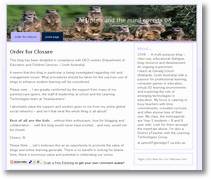 I'm watching with interest on Twitter the unfolding discussion about the decision by the South Australia Department of Education and Children Services to ask for the closure of Al Upton's class blogs (the miniLegends).
I'm watching with interest on Twitter the unfolding discussion about the decision by the South Australia Department of Education and Children Services to ask for the closure of Al Upton's class blogs (the miniLegends).

The miniLegends blogs were written by 8 and 9 year old students in Al Upton's class as part of their learning. Last year Al invited international edubloggers to offer to mentor members of his class by leaving positive comments on their individual blogs.
Sue Waters suggests the order to close the blogs was due to parental concerns over use of young people's photos:
What happened was a few parents became concerned over the use of student images on blogs and potential for cyberstalking because global adult mentors were interacting students. Al had followed all the right procedures and obtained parental consent.
Whilst ensuring young people's protection from significant harm is crucial, the United Nations Convention on the Rights balances protection, provision and participation rights – and as I watched the issues unfolding this morning I thought I should take a look to see what the convention might have to say. So, here's Article 13 from the UNCRC.
Article 13 (Freedom of Expression)
1. The child shall have the right to freedom of expression; this right shall include freedom to seek, receive and impart information and ideas of all kinds, regardless of frontiers, either orally, in writing or in print, in the form of art, or through any other media of the child's choice.
2. The exercise of this right may be subject to certain restrictions, but these shall only be such as are provided by law and are necessary:
(a) For respect of the rights or reputations of others; or
(b) For the protection of national security or of public order , or of public health or morals.
Australia is a signatory to the United Convention on the Rights of the Child. It would be interesting to see how the Committee would respond to the sorts of limitations on young people's expression and information seeking that are becoming all to common because of parental or policy makers irrational fears of the unknown*.
(*I'm not saying all fears are irrational. There are rational fears and concerns. I'm only worried about the cases where fears that are actually irrational (i.e. don't stand up to rational scrutiny) are causing problems.
Good blog post on this. I’ve also blogged on this and provide a link to an interview I did with Al about 4 months ago:http://kerryj.com/2008/03/14/end-of-the-minilegends/
Ridiculous isn’t it – parents do everything they can to get little johnnys picture in the newspaper but mention the word ‘internet’ and pedophiles will surely track down your children!
When we started the first YoMo website I spent hours looking into regulations for using childrens photos online – what I found was no consistency at all – policies ranged from hysteria to nothing! Last week there was an article on BBC about a school photo published online where they had actually blocked out the faces of everyone!
We take thousands of photos a year of young people and upload hundreds online. On parental consents and booking forms we clearly state that photos may be used online and in publicity with the option for parents to opt their child out of photos and films. Only 3 children have been opted out in 8 years (all because they had been victims of abuse), and two groups have requested that we don’t use photos (similar reasons).
The best guidance I’ve seen for using photos is to make sure full names are not used and also nothing that can link children in them to where they live (like street names).
One of the women interviewed standing up for the school in the BBC article said there was a concern that photos of children might be manipulated!
I have 2 young children and have no problem at all with their photos appearing on the school website or anything similar. If the school started censoring them it wouldn’t reassure me – but it would disappoint my children (they’re poseurs!).
I think the tabloid press have a lot to answer for here (as with so many things related to young people).
The trouble is there is so much hype in the media about the dangers of the Internet which contributes to why some parents get concerned. I’ve the same issue with my students, who are 16 upwards, they’ve spent years being told that it’s dangerous to connect with people online they don’t know. Hopefully the media will eventually start publicizing the reports that show the dangers have been blown out of proportion.
lol no doubt you’ll go far in life – probably your best chance of getting a diploma is to pay for it because you clearly don’t understand the purpose and benefits of an education.
Stop talking the the spammers Mike – you’ll only encourage them 😛